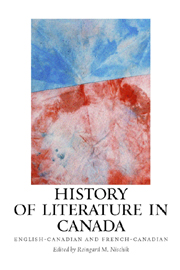Book contents
- Frontmatter
- Contents
- Acknowledgments
- Introduction: Writing a History of Literature in Canada
- I Beginnings
- II The Literature of New France, 1604–1760
- III The Literature of British Canada, 1763–1867
- IV From the Dominion to the Territorial Completion of the Nation, 1867–1918
- 9 English-Canadian Literature, 1867–1918: The Making of a Nation
- 10 French-Canadian Literature from National Solidarity to the École littéraire de Montréal
- V The Modern Period, 1918–1967
- VI Literature from 1967 to the Present
- Further Reading
- Notes on the Contributors
- Index
10 - French-Canadian Literature from National Solidarity to the École littéraire de Montréal
from IV - From the Dominion to the Territorial Completion of the Nation, 1867–1918
Published online by Cambridge University Press: 12 September 2012
- Frontmatter
- Contents
- Acknowledgments
- Introduction: Writing a History of Literature in Canada
- I Beginnings
- II The Literature of New France, 1604–1760
- III The Literature of British Canada, 1763–1867
- IV From the Dominion to the Territorial Completion of the Nation, 1867–1918
- 9 English-Canadian Literature, 1867–1918: The Making of a Nation
- 10 French-Canadian Literature from National Solidarity to the École littéraire de Montréal
- V The Modern Period, 1918–1967
- VI Literature from 1967 to the Present
- Further Reading
- Notes on the Contributors
- Index
Summary
Historical and Cultural Developments
AFTER THE REBELLION OF 1837–1838 was crushed, the signs of a tendency towards defense and retreat in French-Canadian society increased. After 1791, following the division into a western Upper Canada and an (initially) almost exclusively francophone Lower Canada (“Bas Canada”) in the East, the “Canadiens” — the term was not changed to “Canadiens français” until after the middle of the nineteenth century — had attempted a strategy of cooperation and rivalry with their anglophone partner, trying first to exhaust all possibilities within the parliamentary system. The failure of the liberal-patriotic rebellion and the political signals and measures coming from London in the wake of this defeat led to a conflict between resigned willingness to conform on the one hand and a need for “national” affirmation on the other, a conflict that would leave its mark on the cultural life of the francophone population for a long time to come. To be sure, the politics of assimilation — initiated by Lord Durham's report (1839) — failed and were replaced by the federal government's recognition of the francophones (“accommodation”). Nevertheless, the British North America Act of 1867 continued to feed ethnically motivated fears as well as economically motivated feelings of frustration in the face of the “Anglais”-dominated economy.
The constitution of the Dominion of Canada and the inclusion and/or annexation of new territories in the West and East were accomplished without the participation of the French Canadians, who had been reduced to the status of provincials, and in part directly against their wishes.
- Type
- Chapter
- Information
- History of Literature in CanadaEnglish-Canadian and French-Canadian, pp. 127 - 146Publisher: Boydell & BrewerPrint publication year: 2008



